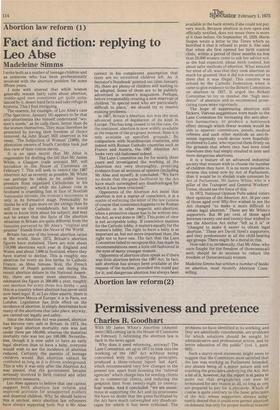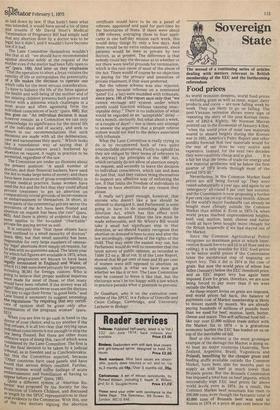Abortion law reform(2)
Permissiveness and pretence
Charles B. Goodhart
With Mr James White's Abortion (Amendment) Bill coming up in the House of Commons on February 7, reforming the abortion law is back in the news again.
Why does it need reforming, anyway? The Lane Committee, set up in 1971 to look into the working of the 1967 Act without being concerned with its underlying principles, produced a three-volume report last April, which recommended very few changes in the present law, apart from licensing the "referral agencies" which charge fees for sending clients on to commercial clinics, and reducing the gestation limit from twenty-eight to twentyfour weeks. And it concluded: "we are unanimous in supporting the Act and its provisions. We have no doubt that the gains facilitated by the Act have much outweighed any disadvantages for which it has been criticised. The problems we have identified in its working, and they are admittedly considerable, are problems for which solutions should be sought by administrative and professional action, and by better education of the public" (vol. 1, para. 605).
Such a starry-eyed statement might seem to suggest that the Committee were satisfied that the law was working as Parliament intended, any abuses being of a minor .nature and not touching the principles. underlying the Act. Not a bit of it, however, for,the report is at pains to point out that pregnancies can now be terminated for any reason at ail, so long as yoll are prepared to pay for it privately. Which of course is quite contrary to the basic principles of the Act, whose supporters always indignantly denied that it could ever permit abortion on demand, but only for proper medical reasons
as laid down by law. If that hadn't been what was intended, it would have saved a lot of time and trouble if Mr David Steel's Medical Termination of Pregnancy Bill had simply said that any abortion done by a doctor was to be legal: but it didn't, and it wouldn't have become law if it had.
The Lane Committee themselves wouldn't like that at all: "we should have recommended against abortion solely at the request of the mother even if the matter had been fully open to US" (para. 189). And later on they emphasise That the operation to abort a fetus violates the sanctity Of life or extinguishes the potentiality Of a life makes the decision to operate one Which calls for the most serious consideration. To have to balance the life of the fetus against the health and well-being of the mother and of her existing children presents both patient and doctor with a dilemma which challenges in a most acute and often agonising form the individual consciences of both" (para. 606). But this goes on: "An individual decision it must however remain: as a Committee we can only acknowledge its significance for the moral life of the individual and of society, and seek to ensure in our recommendations that such decisions are made with all the deliberation, care and earnestness they merit." Which looks like a roundabout way of saying that if 'individual consciences aren't bothered by abortion on request, it ought in practice to be permitted, regardless of the law.
The Committee are under no illusions about the present position: "A small number of doctors, and their financial backers, have used the Act to make large sums of money; and there have been instances of gross irresponsibility in private medical practice. Some women have used the Act and the fact that they could afford Private treatment to get an abortion on comparatively trivial grounds of inconvenience or embarrassment to themselves. In short, in some parts of the commercial private sector the ' provisions of the Act have been flouted and abortion on request has been the rule" (para. 603). And there is plenty of evidence that the same applies to the so-called "charitable" Private fee-paying sector as well. It is certainly true "that these abuses have been confined to a small minority of doctors" (Para. 604), but that small minority has been responsible for very large numbers of ostensiblY 'legal' abortions done simply on request, for at fees with no questions asked. The latest year for which full figures are available is 1973, when 167,149 pregnancies are known to have been legally terminated in England and Wales, of which 111,040 were done 'privately for payment, including 56,581 for foreign visitors. Who is going to believe that proper medical inquiries were made for most of these, or that many would have been refused, if the money was all right? Many patients never even see the doctors they pay to sign their forms "in good faith," and Lane found it necessary to suggest amending The regulations "by requiring that any certificate of opinion shall be given only after examination of the pregnant woman" (para.
521)!
When you are free to go cash in hand to the doctor of your choice, and to try another if the first refuses, it is all too clear that relying upon !ndividual consciences is not enough to stop the law being flouted. But there are other more effective ways of doing this, two of which were considered by the Lane Committee. The first is for the final decision to be taken by a judicial tribunal, as in Sweden and in Czechoslovakia: but this the Committee rejected, because :Other countries have used panels and have round that serious delays resulted. Further, many women would suffer feelings of acute embarrassment and humiliation at having to appear before a panel" (para. 195).
„ Quite a different system of 'Abortion Re • terees was proposed by the Society for the
Protection of Unborn Children, and discussed at length by the SPUC representatives in their oral evidence to the Committee. With this, one Di the two doctors signing the abortion
certificate would have to be on a panel of referees, appointed and paid for part-time by the Secretaries of State. If there were about 1,000 referees, averaging three. to four applicants in one half-day session each week, this would delay things by only a few days. And there would be no extra embarrassment, since patients would be seen in private by two doctors, as at present. The difference is that nobody could buy the decision as to whether or not there were lawful grounds for termination, which is the root cause of most of the abuse of the Act. There would of course be no objection to paying for the privacy and amenities of private treatment, if that were preferred. But the referee scheme was also rejected, apparently because referees on a nominated 'panel' (i.e. a list) were muddled with tribunals, since para. 195 of the report says only that "we cannot envisage any system under which panels could function without causing unacceptable delay." There is no indication of what would be regarded as an "acceptable" delay — not a month, obviously, but what about a week, or a couple of days? — nor is there any attempt to answer the argument that a proper referee system would not lead to the delays associated with tribunals. • What the Lane Committee is really trying to do is to recommend both of two quite irreconcilable alternatives. Firstly to uphold (as they are obliged by their terms of reference to do anyway) the principles of the 1967 Act, which certainly do not allow of abortion simply on request; and secondly to leave the decision to individual consciences, which can and does do just that. And they cannot bring themselves to support any effective way of enforcing the law, if that limits the freedom of individuals to choose to have abortions for any reason they please. It really isn't good enough, however, that anyone who doesn't like a law should be allowed to disregard it, and Parliament is soon going to have to do something about the Abortion Act, which has this effect with abortion on demand. Either the law must be made enforceable, and Mr White's Bill would take a small but significant step in that direction, or we should frankly recognise that abortion on demand is here to stay and alter the law accordingly, regardless of the rights of the child. That may seem the easiest way out, but Parliament would do well to remember that the latest survey of public opinion, as recorded in Table 3.2 on p. 30 of vol. II of the Lane Report, showed that 80 per cent of men and 85 per cent of women were still opposed to abortion on request, which is what we have now got whether we like it or not. The Lane Committee may be content to leave it like that, but the electorate won't be too happy with a law which in practice permits what it pretends to prevent.



































 Previous page
Previous page